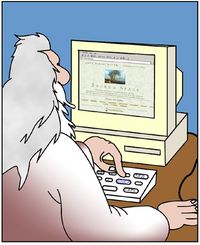Think of this as Volume 17, Number 1 of A-Clue.com, the online newsletter I've written since 1997. Enjoy.

take the final step alone, and no one has reported back anything but
an emptiness or a bright light that drew them in briefly, before life
in the form of a science-taught doctor pulled them back.
Faith replaces understanding. We choose
to believe this or that. And faith is organized through religions.
Faith represents “revealed” truth, stories that may be true or
may not be, but are believed by their adherents because we're all
afraid to die and we all want answers before we go.
There is nothing wrong with faith, but
religions are human institutions. As such they are subject to the
same forces that drive businesses, universities, and states. You're
either growing or you're dying. A business that stagnates starts to
die. Without growth you go backward. The process can seem invisible,
to those inside, but it's an inevitable unraveling in every case.
You grow by getting more. More money,
more power, more customers or adherents. To grow you contend. You
must be aggressive, even ruthless at times. The result is conflict.
Those who lose conflicts die quickly. Those who withdraw die more
slowly, but they do die.

businesses. You grow or you die. Just as men grow, then die,
religions must grow in numbers, grow in wealth, and grow in power, or
they die.
Trouble is, this is incompatible with
the nature of God. Sure, I said that's unknowable, but almost
everyone agrees that the nature of God is not human, that human
nature is not God's nature. What makes you successful in building an
institution is not what brings you to a higher understanding of God.
Any man or woman of faith will tell you that.
So Buddhism was driven out of India by
the more aggressive Hindus. So the Bahai' and Zoroastrians were
driven out of Iran by the more aggressive Muslims. So animism was
driven out of the Americas, and Africa, by more aggressive Christians
and Muslims. So it is within Christianity – passive groups like
the Quakers, Unitarians and Episcopalians lose adherents to more
aggressive, fundamentalist sects that demand more of their members
and constantly evangelize for more.
Powerful religions make demands of
their adherents. To grow, they make more demands, and demand more
adherents. They demand obedience. The power of a religion is directly
related to the amount of crazy stuff its leaders can convince
adherents to do. Acts of greed, of brutality, or murder, are
routinely committed in the name of religious power, and these acts go
unpunished. In fact, groups that don't engage in these acts fade
away, they lose adherents, they die.

Salman Rushdie, is the story of one such piece of brutality. Iranian
shi'ite mullahs, with the power of a state behind them, were
contending for power against Saudi sunni mullahs. The weakness of the
Saudis was in their willingness to deal peacefully with the West,
through the oil industry. Even if, on their own ground, among their
own adherents, they remained hard as nails, still they were tolerant
of Western businessmen, and thus of Western thinking, of other
religions. In seeking prosperity, the Iranian mullahs contended,
sunni sheikhs their souls.
This was and is a nonsense. The nature
of Islam lies in the word submission. Submission to faith, to God.
Not to men. But only men can interpret the faith, and so – as with
Christianity – the submission of the Islamic faith has always been
to men as proxies for God. That God needs no proxy becomes
irrelevant. The world of religion is a world of men.
The fatwa was about this struggle
within Islam. Salman Rushdie was mainly an innocent bystander. Sure,
his father's name came from the philosopher Rushd, an early critic of
Islamic orthodoxy. But “The Satanic Verses” was just a book, just
a collection of words, just a story. What's the use of a story that
isn't even true?

down and kill this innocent man, just as they hunted down all
dissidents, the Iranian mullahs were contending for growth, acting on
behalf of their religion, and committing grave crimes against God.
God doesn't need Salman Rushdie to die. Rushdie will die, in his own
time, in his own way, as we all will, and then he and I and you and
the mullahs and the pederastic priests and the bishops in Rome who
cover for them will all face the true nature of God alone. Khattam
Shud. The end.
When any religion takes the power of a
state it becomes the state, and in that instant loses all its
holiness. America is a land of religious faith precisely because we
don't allow this. All may contend, all may compete, but none may
compel. And so Americans go freely to religion. To all sorts of
religions.
But we also see, here, conflict between
the nature of religion, which is man-made, and the nature of God,
which no one can know. The more passive religions lose power and
money and adherents. Those that demand more gain and grow. Those that
demand power over man gain more in the world, and compromise their
nature, eventually losing track of it completely. But believers don't
care about that. Instead, we believe.
For practicing the only faith that is
true, the free inquiry of a free mind, Salman Rushdie was imprisoned
behind state protection for over a decade. And out of that came what
I think is his greatest work – “Haroun and the Sea of Stories.”
A childrens' book, written for his son, who didn't understand the
nature of his father's captivity, Haroun answers the question, what's
the use of stories that aren't even true. From stories that aren't
even true comes the courage to stand up to authority, to take back
the night, to become fully human in the face of oppression, whether
that of a state, a religion, or religion acting in the state's name.

closer to God. Until, that is, the faith they inspire organizes
around the story. Then it becomes a religion, something man made, and
something very different indeed. If it grows, and becomes something
more than a story, what is true inside it begins to die. Turn a story
that isn't even true into a religion and it can gain power, but it
loses its plot, and ultimately its power. It becomes something else.
It becomes what it was written to protest against.
The nature of God is unknowable. But we
do have one way of at least creating a user's manual. It's called
science. Science may be, in some ways, incompatible with religion.
But unlike religion, in which we must believe, science works. We
don't have to believe in gravity, or evolution, or quantum mechanics.
It just works. It leads us on, with more questions, and more
questions, important and unimportant questions. Unlike the
institutions built by religion, those built by science pile fact upon
fact, building value, building technologies, building, together,
God's user manual.
Science is not religion. Science need
not be believed. But science is a far truer expression of man's faith
in God than any religion, if only because in science we answer
questions that have answers.
Religion can imprison art. Religion can
imprison men. Religion can seek to imprison science, to prevent its
dissemination. Religion can seek to keep this Internet – a humble
product of science – from doing its work of liberating mens' minds.
But I don't think it will succeed. I can't say why.
I guess I just have faith.











Each religion has its Own God so specify which religion you are referring to because you can never separate the supernatural God gfrom Christianity
Each religion has its Own God so specify which religion you are referring to because you can never separate the supernatural God gfrom Christianity
.. there is One supreme God for us all and the creator of heaven and earth.
.. there is One supreme God for us all and the creator of heaven and earth.
No one should ever have to die arguing about that. Your view of God, my view of God, they’re all valid until someone comes back from death with evidence of who’s right.
No one should ever have to die arguing about that. Your view of God, my view of God, they’re all valid until someone comes back from death with evidence of who’s right.